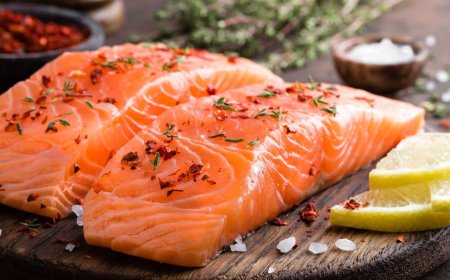Soothing Foods That Help You Feel Better During a Cold
Looking for comfort while you're sick? Discover what to eat when you have a cold, including soothing, immune-boosting foods that help you recover faster and feel better.

Catching a cold is never convenient. Whether it starts with a sore throat, a runny nose, or body aches, it can make even the simplest tasks feel difficult. While theres no instant cure for the common cold, your diet can make a significant difference in how quickly you recover and how manageable your symptoms feel. Knowing what to eat when you have a cold can help soothe discomfort, boost your immune system, and restore your strength.
This guide will explore the most soothing, nourishing foods to help you feel better during a coldand which ones to avoid. Whether you're trying to ease a sore throat or fight off fatigue, your kitchen holds powerful ingredients that can support your body during recovery.
Why Food Matters When Youre Sick
When your immune system is working hard to fight off a cold virus, your body needs extra support in the form of nutrients, hydration, and energy. Even if your appetite is low, choosing the right foods can help:
-
Reduce inflammation
-
Clear nasal and chest congestion
-
Soothe sore throats
-
Replenish fluids
-
Provide energy for healing
-
Strengthen immune response
Thats why understanding what to eat when you have a cold is essential for comfort and recovery.
Top Soothing Foods to Eat During a Cold
Here are some of the best foods to eat when youre battling a cold, especially if youre experiencing symptoms like congestion, sore throat, cough, or fatigue.
1.Chicken Soup
A time-tested remedy, chicken soup is more than just comfort foodits scientifically supported as one of the top foods for cold relief. The warm broth helps thin mucus, making it easier to clear your sinuses, while the combination of protein, fluid, and vegetables provides essential nutrients.
Chicken also contains cysteine, an amino acid that may reduce inflammation and support respiratory health.
How to enjoy: Add garlic, carrots, celery, and onions to enhance the immune-boosting properties of your soup.
2.Broths and Bone Broth
If youre not up to eating solids, sipping warm broth can provide hydration, minerals, and a soothing sensation for a sore throat. Bone broth, in particular, is rich in collagen, gelatin, magnesium, and other immune-supportive compounds.
How to enjoy: Sip slowly throughout the day to stay hydrated and keep your throat moist.
3.Ginger
Ginger is well-known for its anti-inflammatory and antioxidant properties. It can help soothe sore throats, reduce nausea, and ease digestive discomfort.
How to enjoy: Grate fresh ginger into hot water for a warming tea, or add it to soups and stir-fries.
4.Honey
Honey is a natural cough suppressant and antibacterial agent. It coats the throat to relieve irritation and can also promote better sleep when youre congested or coughing at night.
How to enjoy: Mix a teaspoon of honey into warm tea with lemon and ginger, or take it straight from the spoon.
5.Citrus Fruits
Vitamin C plays a vital role in immune health. While it doesnt prevent colds, it may help reduce the duration and severity of symptoms. Citrus fruits like oranges, grapefruits, lemons, and limes are excellent sources of vitamin C and hydration.
How to enjoy: Drink warm lemon water with honey or enjoy orange slices with a small meal.
6.Bananas
Bananas are gentle on the stomach and easy to digestespecially useful if your cold is accompanied by nausea or fatigue. They also provide potassium, a key electrolyte that supports nerve and muscle function.
How to enjoy: Eat them alone or blend into a smoothie with yogurt and a bit of honey.
7.Oatmeal
Oatmeal is soft, warm, and easy to eat when you dont have much appetite. It contains beta-glucan, a type of fiber that helps regulate the immune system, along with B vitamins, iron, and magnesium.
How to enjoy: Add sliced banana and a drizzle of honey for a nutrient-packed, comforting breakfast.
8.Yogurt and Probiotic-Rich Foods
Probiotics help balance the gut microbiome, which plays a critical role in immune response. Unsweetened yogurt with live cultures can support gut health and digestion while offering protein and calcium.
How to enjoy: Eat plain yogurt with a bit of honey or blend into a fruit smoothie.
9.Leafy Greens
Leafy greens like spinach, kale, and Swiss chard are high in vitamins A, C, and E, which help regulate immune function and reduce inflammation. They also provide fiber and minerals that support overall wellness.
How to enjoy: Add chopped greens to soup or blend them into a green smoothie.
10.Garlic
Garlic contains allicin, a compound with powerful antibacterial and antiviral properties. It supports the immune system and may help fight off viruses more effectively.
How to enjoy: Add freshly chopped garlic to broths, soups, or stir-fried vegetables.
What to Drink When You Have a Cold
Hydration is just as important as food when youre sick. Drinking plenty of fluids helps:
-
Thin mucus
-
Prevent dehydration
-
Regulate body temperature
-
Soothe sore throats
Best drinks when you have a cold:
-
Warm water with lemon and honey
-
Herbal teas like peppermint, chamomile, or ginger
-
Electrolyte drinks (low-sugar versions)
-
Broths
-
Diluted fruit juices
Avoid caffeine and alcohol, as they can be dehydrating and interfere with rest.
Foods to Avoid When You Have a Cold
Just as there are foods that help, there are also ones that may worsen your symptoms or slow recovery. Heres what to avoid:
-
Sugary snacks and drinks: Excess sugar can suppress immune function.
-
Highly processed foods: Often lack essential nutrients and contain additives.
-
Dairy (for some individuals): May increase mucus for those who are sensitive.
-
Fried and fatty foods: Can be hard to digest and cause bloating.
-
Caffeinated beverages: Can interfere with sleep and hydration.
Choosing the right foods and drinks can make a big difference in how you feeland how quickly you recover.
Sample Sick-Day Meal Plan
Heres a simple meal plan to help guide what to eat when you have a cold:
Morning:
-
Oatmeal with banana and honey
-
Warm ginger tea with lemon
Mid-Morning Snack:
-
Plain yogurt with berries
Lunch:
-
Chicken and vegetable soup
-
Whole-grain toast (optional)
Afternoon Snack:
-
Orange or grapefruit slices
-
Herbal tea
Dinner:
-
Steamed rice with sauted spinach and garlic
-
Bone broth on the side
Before Bed:
-
Warm water with honey and lemon
This plan emphasizes warm, soothing foods that are easy to digest and support immune health.
When to See a Doctor
While most colds resolve on their own within 710 days, you should see a healthcare provider if you experience:
-
High fever lasting more than 3 days
-
Shortness of breath or chest pain
-
Symptoms that worsen after initial improvement
-
Dehydration or inability to keep food down
A cold is usually mild, but its important to watch for signs of complications such as sinus infections or bronchitis.
Final Thoughts
Understanding what to eat when you have a cold empowers you to take charge of your recovery. The right foods can help reduce symptoms, restore energy, and shorten the duration of your illness. From nourishing soups and immune-boosting teas to vitamin-rich fruits and comforting grains, food is a powerful ally in your healing process.
The next time you feel a cold coming on, remember: with proper rest, hydration, and soothing nutrition, you can feel better fasterand stronger.





















![Top 11 Real Estate Mobile App Developers in Riyadh, Saudi Arabia [2025 Edition]](https://www.philadelphialivenews.com/uploads/images/202506/image_430x256_68621a9e48997.jpg)
























